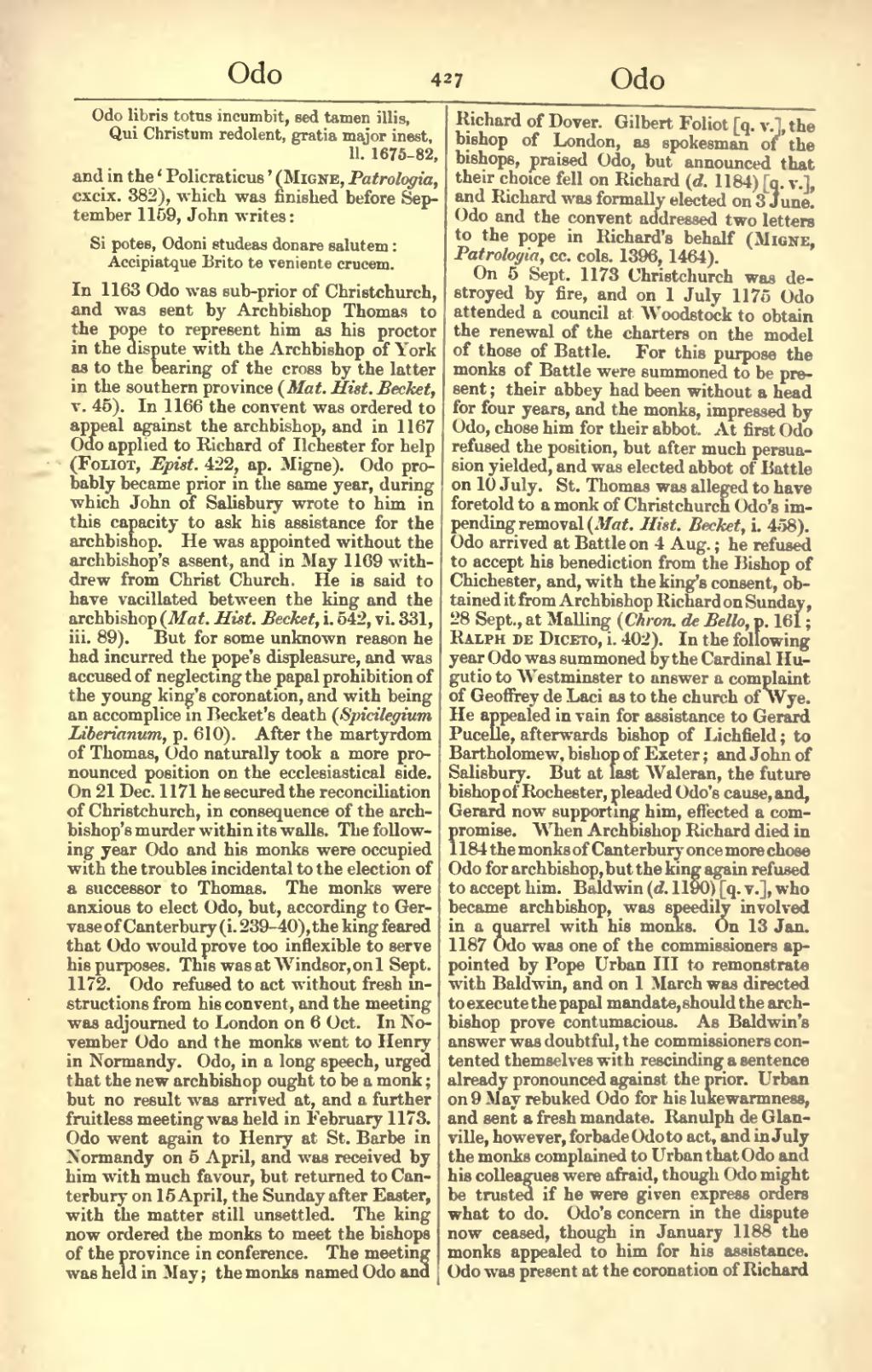Odo libris totus incumbit, sed tamen illis,
Qui Christum redolent, gratia major inest,
ll. 1675–82,
and in the ‘Policraticus’ (Migne, Patrologia, cxcix. 382), which was finished before September 1159, John writes:
Si potes, Odoni studeas donare salutem:
Accipiatque Brito te veniente crucem.
In 1163 Odo was sub-prior of Christchurch, and was sent by Archbishop Thomas to the pope to represent him as his proctor in the dispute with the Archbishop of York as to the bearing of the cross by the latter in the southern province (Mat. Hist. Becket, v. 45). In 1166 the convent was ordered to appeal against the archbishop, and in 1167 Odo applied to Richard of Ilchester for help (Foliot, Epist. 422, ap. Migne). Odo probably became prior in the same year, during which John of Salisbury wrote to him in this capacity to ask his assistance for the archbishop. He was appointed without the archbishop's assent, and in May 1169 withdrew from Christ Church. He is said to have vacillated between the king and the archbishop (Mat. Hist. Becket, i. 542, vi. 331, iii. 89). But for some unknown reason he had incurred the pope's displeasure, and was accused of neglecting the papal prohibition of the young king's coronation, and with being an accomplice in Becket's death (Spicilegium Liberianum, p. 610). After the martyrdom of Thomas, Odo naturally took a more pronounced position on the ecclesiastical side. On 21 Dec. 1171 he secured the reconciliation of Christchurch, in consequence of the archbishop's murder within its walls. The following year Odo and his monks were occupied with the troubles incidental to the election of a successor to Thomas. The monks were anxious to elect Odo, but, according to Gervase of Canterbury (i. 239–40), the king feared that Odo would prove too inflexible to serve his purposes. This was at Windsor, on 1 Sept. 1172. Odo refused to act without fresh instructions from his convent, and the meeting was adjourned to London on 6 Oct. In November Odo and the monks went to Henry in Normandy. Odo, in a long speech, urged that the new archbishop ought to be a monk; but no result was arrived at, and a further fruitless meeting was held in February 1173. Odo went again to Henry at St. Barbe in Normandy on 5 April, and was received by him with much favour, but returned to Canterbury on 15 April, the Sunday after Easter, with the matter still unsettled. The king now ordered the monks to meet the bishops of the province in conference. The meeting was held in May; the monks named Odo and Richard of Dover. Gilbert Foliot [q. v.], the bishop of London, as spokesman of the bishops, praised Odo, but announced that their choice fell on Richard (d. 1184) [q. v.], and Richard was formally elected on 3 June. Odo and the convent addressed two letters to the pope in Richard's behalf (Migne, Patrologia, cc. cols. 1396, 1464).
On 5 Sept. 1173 Christchurch was destroyed by fire, and on 1 July 1175 Odo attended a council at Woodstock to obtain the renewal of the charters on the model of those of Battle. For this purpose the monks of Battle were summoned to be present; their abbey had been without a head for four years, and the monks, impressed by Odo, chose him for their abbot. At first Odo refused the position, but after much persuasion yielded, and was elected abbot of Battle on 10 July. St. Thomas was alleged to have foretold to a monk of Christchurch Odo's impending removal (Mat. Hist. Becket, i. 458). Odo arrived at battle on 4 Aug.; he refused to accept his benediction from the Bishop of Chichester, and, with the king's consent, obtained it from Archbishop Richard on Sunday, 28 Sept., at Malling (Chron. de Bello, p. 161; Ralph de Diceto, i. 402). In the following year Odo was summoned by the Cardinal Hugutio to Westminster to answer a complaint of Geoffrey de Laci as to the church of Wye. He appealed in vain for assistance to Gerard Pucelle, afterwards bishop of Lichfield; to Bartholomew, bishop of Exeter; and John of Salisbury. But at last Waleran, the future bishop of Rochester, pleaded Odo's cause, and, Gerard now supporting him, effected a compromise. When Archbishop Richard died in 1184 the monks of Canterbury once more chose Odo for archbishop, but the king again refused to accept him. Baldwin (d. 1190) [q. v.], who became archbishop, was speedily involved in a quarrel with his monks. On 13 Jan. 1187 Odo was one of the commissioners appointed by Pope Urban III to remonstrate with Baldwin, and on 1 March was directed to execute the papal mandate, should the archbishop prove contumacious. As Baldwin's answer was doubtful, the commissioners contented themselves with rescinding a sentence already pronounced against the prior. Urban on 9 May rebuked Odo for his lukewarmness, and sent a fresh mandate. Ranulph de Glanville, however, forbade Odo to act, and in July the monks complained to Urban that Odo and his colleagues were afraid, though Odo might be trusted if he were given express orders what to do. Odo's concern in the dispute now ceased, though in January 1188 the monks appealed to him for his assistance. Odo was present at the coronation of Richard
